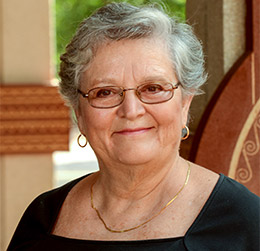
Theda Perdue has amassed many accolades and achievements during her career of 30-plus years. She says her most rewarding role can be summed up in three words: graduate student mentor.
She reflects, specifically, on her 13 years at Carolina: “I came to UNC at the height of my career, and graduate students were my top priority. Mentoring a graduate student is a creative enterprise and a collaborative process. I have enjoyed it so much, and my graduate students have been very gifted and hard working.”
Perdue is the Atlanta Distinguished Professor Emerita of Southern Culture. Her academic career includes 15 books, the John Simon Guggenheim Foundation Fellowship and numerous other fellowships – as well as a UNC-Chapel Hill distinguished professorship named in her honor.
Perdue and her husband, Michael D. Green, hosted prospective graduate students and their families – and even held graduate classes – in their home. They visited students experiencing important milestones in their lives and attended talks by former students who returned to Carolina to present their research. Green, also a much-admired graduate student mentor, was professor emeritus of American Studies at the University when he passed away in 2013.
Mikaëla M. Adams, an assistant professor of Native American history at the University of Mississippi, says Perdue was an outstanding graduate mentor for many reasons. “From my first day in graduate school, Theda was there to guide me through the process and to teach me how to become an ethnohistorian and a professional scholar. She not only helped me to refine my research and writing skills, but she also taught me how to succeed in academia.”
Adams remembers attending the American Society for Ethnohistory conference as a Carolina graduate student. Perdue and Green invited Adams to join them and two other prominent scholars in Native history on a day trip along the Oregon coast. “On that trip I got to interact with ‘giants’ in my field in a very direct way – I made contacts and had conversations that otherwise would have been impossible. In this way, Theda gave me a window into academic life and helped me feel like I was already part of a community of scholars, even as a young graduate student.”
Perdue has mentored 19 doctoral students in her academic career, including eight at Carolina. Her approach focused on a few key priorities for writing a dissertation: defining the student’s research topic early, prioritizing sources, taking research notes instead of relying on copies and organizing thoughts effectively. Then she insisted that students write clearly and avoid jargon. Perdue says her mother was an avid reader with only a high school diploma, and she always wrote with her mother in mind. Good history should bridge a gap between the academy and the broader world. “Their work should be scholarly and accessible.”
Perdue’s students have focused on Native peoples and their histories, and she says her graduate students have an ethical obligation to Indigenous peoples. That extends to Native students on campus: “All of my students understand their ethical obligation to make Native students welcome at the University.”
One of her former UNC-Chapel Hill graduate students, Christina Snyder, chairs Indiana University’s Committee on Native American and Indigenous Studies, and is the Thomas and Kathryn Miller professor of history at IU. She says she came to Carolina specifically to study with Perdue and Green, whom she describes as “among the preeminent scholars of Native American history.”
“Theda has written some of the most important works in the field on topics ranging from politics to race to gender to memory and co-edited the premier book series on Southeastern Indians. She’s my academic hero, and her scholarship continues to inspire me.”
While doctoral students at Carolina, Adams and Snyder were Sequoyah fellows within The Graduate School’s Royster Society of Fellows. Perdue is a member of the faculty board for the Royster Society, which is The Graduate School’s select interdisciplinary fellowship program.
Adams says Perdue is still available to provide career advice and answer any questions about the “academic world,” and Snyder agrees that the mentoring relationship didn’t end (“or even wane”) after graduation.
“I know that I speak for many of Theda’s students when I say that we are not just colleagues or friends; we are more like a family bound by ties of love and respect for one another and for the work we share,” she adds.
For Perdue, that feeling of family is just as strong.
“I never consider myself to be through with a graduate student. They are always my intellectual children.”
